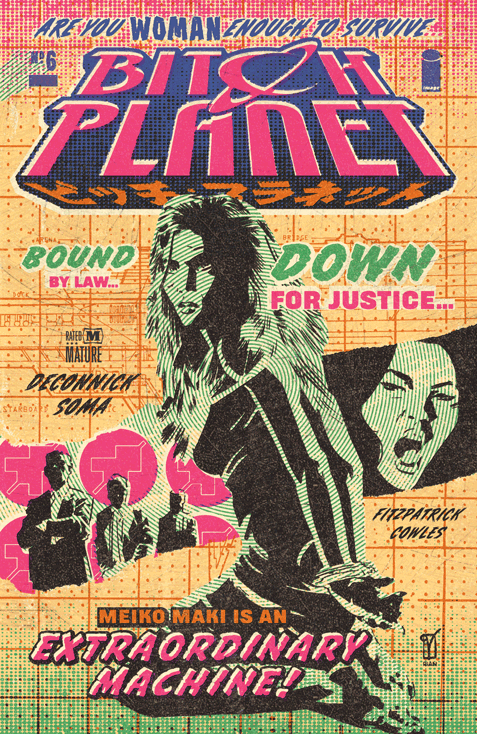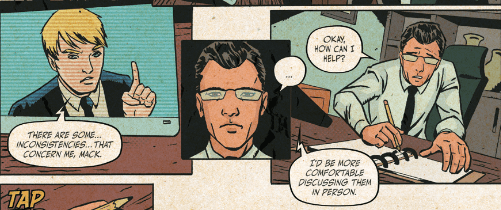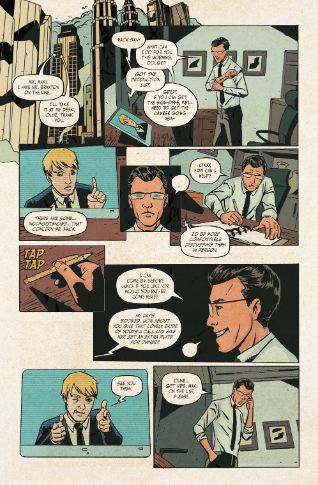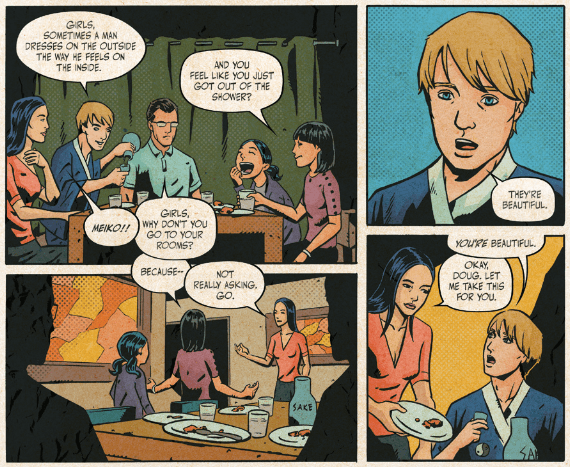
See Cell by Cell: Bitch Planet #6 part 1 here.
Click here if you’d prefer to see my review of the issue.
Now the comfortable, happy family stuff falls away when Mr. Braxton calls Makoto at the office. The panels are layered and unaligned, creating a faster pace and chaotic mood. Cell 1 gives an establishing shot of the skyscraper that houses Maki’s business. The panel starts in lighter shades of yellow, blue, and pink with heavy contrasting shadows. This is a conversation that seems pleasant but has dark threats underneath. Cell 2 re-establishes the scene’s layout with a medium-long framing of the office interior. Braxton appears on a video screen. Makoto is initially standing, showing his position of power in the moment. In the next row of panels, he will sit as the power shifts. The many blues give the scene a coolness, reflecting the blackmailing that is being slowly delivered to Makoto.
Cell 3 is Makoto’s point-of-view of Braxton on the vidscreen. He’s a young, blond man, his finger wagging in accusation and disapproval as he mentions inconsistencies in the plans that concern him. There is a condescension implied in Braxton’s manner. His youth accentuates his privilege as a white man. Though he barely seems old enough to have finish college, he is overseeing Maki’s work. In cell 4, we see Braxton’s point-of-view of Makoto’s reaction. It’s a small panel, implying the small estimation of Maki’s power in this situation. Mack is initially speechless, perhaps trying to figure out how best to respond. His background has gone black, showing the mental and emotional abyss he’s in contemplating being caught at sabotaging the space ship.
Then in cell 5, he sits down, submitting Braxton’s “concerns”. His face shows worry as he positions himself to write down the complaint. The panel uses a canted or Dutch angle to show how Braxton’s request to talk about it in person has thrown Makoto off-kilter. Cell 6 continues the focus on Mack’s nervousness by showing his tapping of a pencil on the desk. The panel allows another moment of thought to pass before Mack suggests coming by before lunch in cell 7. Again, the background is black, foreboding. When Braxton invites himself over for dinner, Makoto is once again speechless, the ellipses giving another space for pause. Cell 8 has Braxton giving Mack finger guns and taking the silence as submission. He’s got a frat boy entitlement to him.
The call ended, Mack tells Olive, his assistant, to get Yume on the line in the final panel. His fingers press against his temple in the universal sign of anxiously trying to think a way out of a problem.
Jumping ahead to the Maki’s hosting of Braxton for dinner, things get awkward immediately. Cell 1 gives us the establishing shot of the house, but cell 2 has Mirai doing what kids do best–having no filter. The bright magenta background emphasizes the embarrassment of the moment as she asks about Braxton’s absurd attire. He’s dressed in a traditional Japanese robe. He’s a Japanophile, but his sense of the culture is reductive and condescending. In cell 3, Yume repremands Mirai, but Braxton dismisses it, saying the girls don’t mean any harm. Meiko expresses disbelief. Foreshadowing: she certainly will mean harm.
In cell 4, Braxton explains: “Girls, sometimes a man dresses on the outside the way he feels on the inside.” He means that he feels Japanese on the inside, which is a special kind of cultural appropriation through fetishism. It’s icky, which is why Meiko’s question–“And you feel like you just got out of the shower?”–is so wonderfully ironic. He refills his sake. Since the girls have no sense of decorum, and Makoto knows what’s on the line, he recommends they go to their rooms.
Rather than going left to right, the cell 5 is below the last to use the same width to show all five characters. Meiko begins a rebuttal to why they should stay, but Yume just directs them to go. In the background, the orange-yellow paintings have been brought back into frame, renewing the sense of tension and danger. In cell 6, Braxton, who is clearly has gotten by most of life on privilege rather than charisma, awkwardly comments that the girls are beautiful. Then he tells Yume in cell 7 that she’s beautiful. Yume doesn’t take the compliment so much as deflect quickly and take his dirty plate instead. Yume may assume he’s overdone it on the sake, but that’s just a convenient excuse for his sense of entitlement and privilege.
Braxton appropriates culture ignorantly, as a set of symbols without deeper meaning or larger context, and then assumes he knows the value of it. His attitude is of the imperialist, exploring and claiming what he sees as his right. He manipulates the vulnerability he has found in Makoto in the interest of taking even more in his sense of privilege and power.




